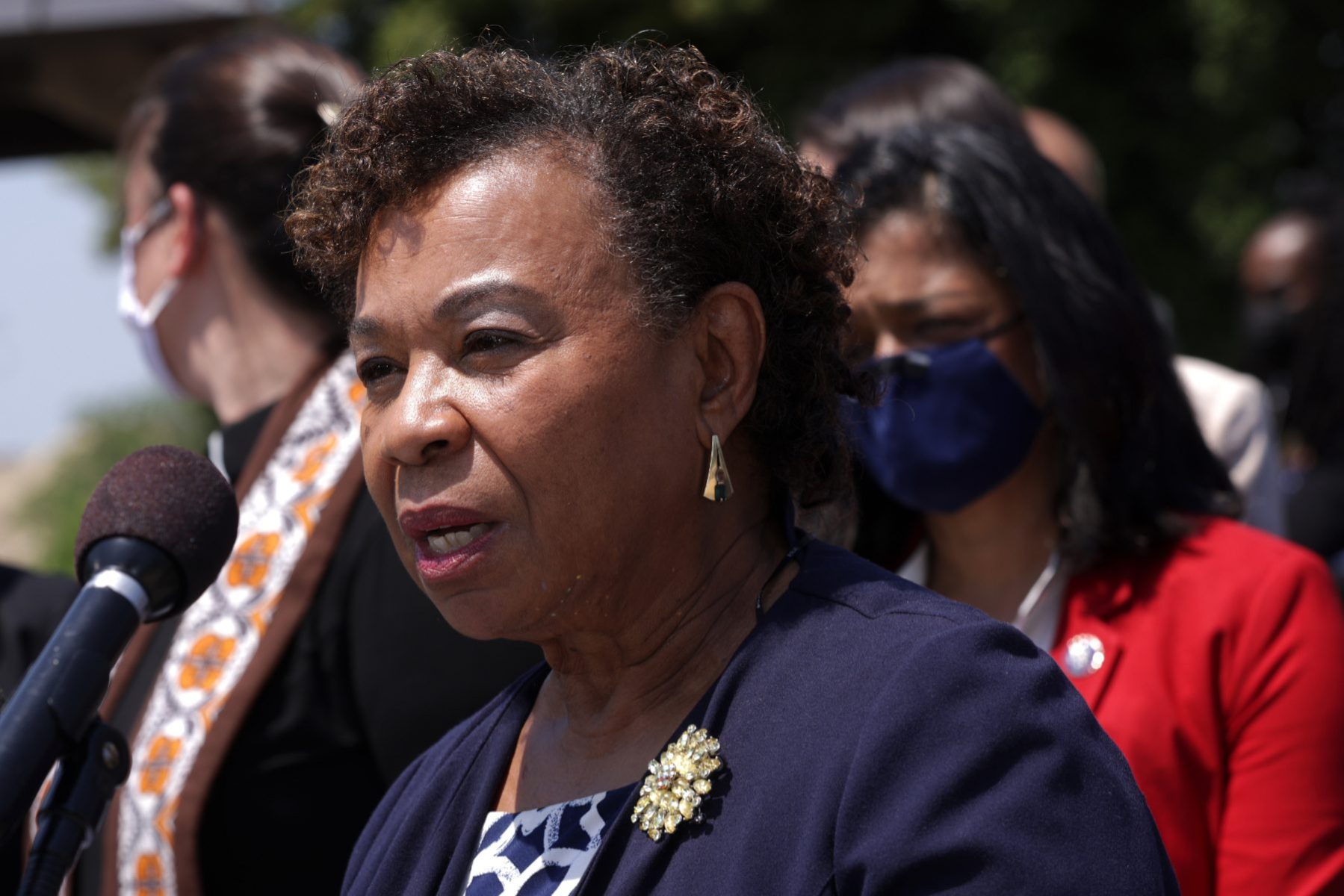Twenty years ago, as the country reeled from the September 11 attacks and Congress moved quickly to authorize the use of military force in what became known as the U.S. War on Terror, Rep. Barbara Lee urged her colleagues to “pause, just for a minute.”
“Some of us must urge the use of restraint, our country is in a state of mourning,” the California Democrat said ahead of congressional votes authorizing President George W. Bush to use “all necessary and appropriate force” to respond to terrorism.
“Some of us must say, ‘Let’s step back for a moment, let’s just pause, just for a minute, and think through the implications of our actions today so that this does not spiral out of control,’” Lee added.
But, when the House of Representatives and Senate voted, there was no “us.” Lee was the only lawmaker in either chamber to vote against the 2001 Authorization for Use of Military Force (AUMF) that started a 20-year U.S. military presence in Afghanistan that spanned the administrations of four presidents and resulted in the deaths of more than 2,400 American troops.
The 19th spoke to Lee ahead of the 20-year anniversary of the terrorist attacks, and as President Joe Biden’s administration completes the United States’ withdrawal from the country, about “forever wars,” why she opposed the 2001 and 2002 AUMFs and her bills to repeal both.
This interview has been edited for length and clarity.
Amanda Becker: I think people forget how quickly the vote to authorize the use of military force to fight terrorism came after the 9/11 attacks, just three days later, on September 14. Looking back, what was the tenor in Congress and what was on your mind as you were weighing that vote?
Barbara Lee: The quickness of it, first of all. It was such an overly broad authorization that set the stage — I knew then — for forever wars, in terms of a president never having to come back to Congress for authorization for going to war, or using military force anywhere in the world. I knew that.
I also knew very clearly, based on my background in psychology and clinical social work, that you don’t make hard, serious decisions when you’re in the midst of grieving and when you’re mourning, when you’re angry, when you’re emotional. And of course our country was grieving. We lost so many people. A terrorist attack shocked the very core of our democracy. It was a horrific time. And three days later we come up with an authorization that was so overly broad that the costs and consequences were not even debated. Really, quite frankly, I don’t believe we knew what we were doing, other than responding to the horrific attacks and attempting to bring terrorists to justice.
I’m not a pacifist. My father was a lieutenant colonel, retired from the military after 25 years, served in Korea, and in World War II. I know the grave implications of sending our troops into harm’s way, and the impact on military families. And I know we’d better be ready, we’d better know what we’re doing. We’d better do this with our strategy in mind and an exit strategy. Congress needs to know exactly what the deal is. I didn’t think three days after this terrible attack that we had enough information or knew exactly what we should do.
Did you know when you voted ‘no’ that you would be the only one? Do you think with more time you could have gotten to a place where you could have voted yes? Or did you think, at that point, it was just not a good idea to get involved in Afghanistan in any capacity?
No, I did not know who was going to vote for it; that wasn’t even part of my thought process. I didn’t see this in political terms. I knew that it was much too soon to come up with whatever response we will come up with. We have to think through the implications of our actions today, and what it would mean for tomorrow, for the troops. Would we be able to accomplish the mission? Would it prevent further acts of terrorism? Members of Congress needed to be thoughtful, rational and clear on why we were doing what we were doing. I did not know who was going to vote yes, who was going to vote no. I figured most members would vote yes. But I tried to talk to members in our Democratic caucus and speak up and talk about why I thought this was not the right time and why I thought it was overly broad, and we should take time — if we were going to respond to militarily — to know what the heck was going on, what we were doing.
Right now, you are working to resettle refugees as they are evacuated — you and Rep. Alexandria Ocasio-Cortez recently sent a letter to the Biden administration asking them to raise the refugee admissions cap. What do you expect going forward in terms of the resettlement process?
I think we need to lift the cap, as we said in our letter, so we’re working now to get the administration to lift the cap on refugees. Secondly, I’ve talked with the administration about what we can develop as a plan that would help women, especially, and children and girls, to make sure that the progress they’ve made is not thwarted, and that their security is such that we can ensure their safety.
A lot of that has to do with who our allies will be: Are we going to work with NGOs? The United Nations? All of that is still coming together. We know who the Taliban government is — I’m not sure what kind of partner they’re going to be. We have to find ways to do our development, diplomatic and humanitarian work for women and girls and children — and for the Afghan people in general — through a variety of non governmental ways, or with our allies. So that’s what we’re working on now.
Also, I’m helping to raise money for Afghan resettlement in my area, like many members of Congress throughout the country are, because they absolutely need our help. They supported the United States, we need to support them. That’s just the way it works. We have to honor what they did, and help them by whatever means necessary. There’s also this big issue between asylum seekers versus refugees. We’ve got to sort all that out. But we need to make sure that the benefits are there, that they get resettled, that they are able to get decent jobs and housing.
Your legislation to repeal the 2002 AUMF against Iraq passed the House. What’s next? Do you feel good about that happening this year?
We’re certainly working on it and I’m hoping Sen. [Chuck] Schumer will bring it up on the Senate floor [for a vote]. I’ve talked with Sen. [Tim] Kaine, and we have Republican support, but I’m not sure how many Republican votes right now. It’s a priority of mine to try to get it onto the Senate floor. We were looking at possibly September, but we want it done as quickly as possible. The president has indicated that he would sign it, he issued a statement of administration policy when I brought it to the floor of the House. And so we just have to keep working and asking Sen. Schumer to make sure that it’s a priority and I know Sen. Kaine is doing just that.
Do you think your other bill, to repeal 2001’s AUMF, will get some renewed support or interest as we kind of watch this withdrawal play out and you’re debating repealing the 2002 AUMF?
Yes, we have a working group of national security members who are across the spectrum politically. Most agree that there has to be a sunset to these AUMFs and that we have to have some guardrails and criteria. What I’m trying to do is get my 2001 passed, which repeals the 2001 authorization, which is Afghanistan, but actually leaves it in place for eight months in case the president thinks that he needs to use that. Because what we’re talking about is, should we replace it versus should we not, should we repeal? We’re having those discussions. My position is: We passed the 2001 AUMF in three days, you can’t tell me Congress can’t pass another one within eight months’ time if the president thinks he needs the authorization to use force. We’re working very diligently, all of us together with different points of views, bringing them together, so that we can get the 2001 repealed.
You’ve talked about the dangers of an imperial presidency and how Congress has abdicated its responsibility. Could you explain to somebody who isn’t as well versed as you are on this topic what that means and how the 2001 and 2002 AUMF votes should have played out versus how they did?
There are three branches of government, the judicial, the legislative and the executive branch. Each branch has their role and responsibilities per our Constitution. The Constitution requires members of Congress to authorize or declare war, not the president. The president can always use the military option to go to war if we’re under imminent threat, that’s a given, but when it comes to the issue of inserting our troops into a war, then in fact, the Congress must authorize it. Otherwise, this does create an imperial presidency, which it is now quite frankly.
Any president — President Bush, President Obama, President Trump, now President Biden — they all can use that authorization that we passed in 2001 in perpetuity to go anywhere in the world. And they’ve used it over 41 times. I have a declassified study done by the Library of Congress, which has shown where this authorization has been used, in no way connected to 9/11. For instance, in Niger, where those brave troops were killed. It’s been used for domestic spying. It’s been used all over the world not related to 9/11. So the bottom line is: If the president wants to go to war, constitutionally, he’s required to come to Congress. In our democracy, this is the people’s house, the people’s voice. So what it means now is that the people in our country have lost their ability to have their voice and their positions heard. We’ve abdicated your voice, the people’s voice, to the executive branch. That’s what an imperial presidency entails. And to me, that is fundamentally a slippery slope we’re on in this country.
Are there lessons for lawmakers from the last 20 years in Afghanistan and how our presence there ended?
First of all, one is you can’t go around the world nation building. I think that’s what we attempted to do in Afghanistan. Several trillion dollars have been lost. We know the Afghan government was corrupt, and we’re trying to find out exactly how much U.S. tax dollars were spent and stolen in Afghanistan.
We need to get defense spending under control, it’s $740 billion [for Fiscal Year 2021]. What we’ve been trying to get [Congress] to do is support a minimum 10 percent cut in defense spending, that’s $74 billion that could be used to support our troops, enhance their quality of life and also for domestic spending. So that’s one lesson people need to really think about. It’s not going to harm our national security, we have counterterrorism measures in place, and we have more than enough resources to maintain global leadership in the world as it relates to defense.
We need to have more balance between defense, diplomacy and development. I chair the subcommittee of the Appropriations Committee that funds all of our development and diplomatic initiatives. My budget is $62 billion. The country needs to start reimagining our national security strategies and recognize how we get to peace and security, and it’s not necessarily through using the military-first approach. That’s the second lesson: Let’s think about the fact that the military solution is always on the table if the president needs it, but why do we use that as the first option? Why don’t we seek to find a variety of strategies that can help reduce tensions in the world and create for a safer and more secure and a more peaceful world? We have to start talking about peace, and how we achieve that.
Dr. [Martin Luther] King Jr., and all of those who came before us, really talked about the fact that peace is not just the absence of war, it is the presence of justice. We have to really begin to look at what that means. And look back in the last 20 years and think about how we now move forward, lessons learned, and make sure that the investigations move forward to determine where that money was misspent, we owe taxpayers full accounting of what took place. We’ve lost over 2,400 brave troops. They’ve done everything in the world that we asked them to do, they served with honor. Now we need to take care of our veterans and all the issues they’re dealing with in terms of health, their families, and their economic security. It’s way past time to have brought them home and figured out a way to support development and diplomacy in Afghanistan without having a military footprint.







